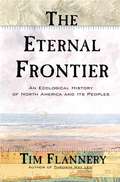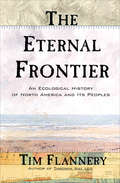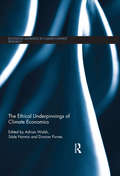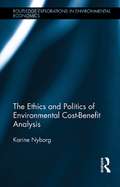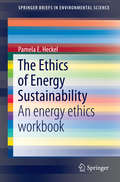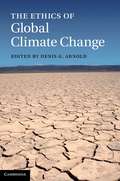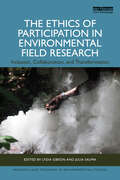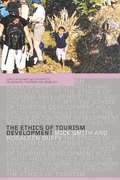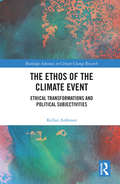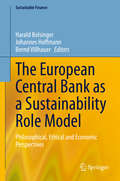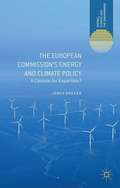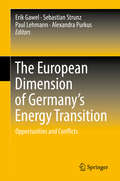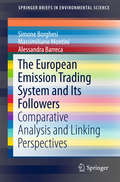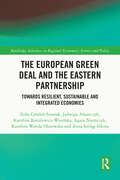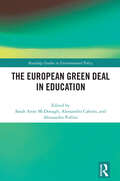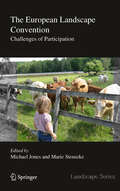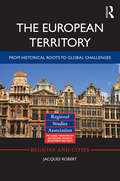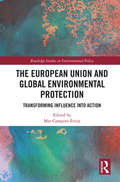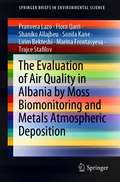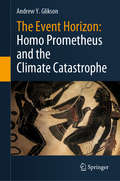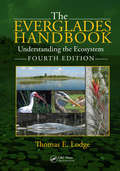- Table View
- List View
The Eternal Frontier: An Ecological History of North America and Its Peoples
by Tim FlanneryIn "The Eternal Frontier," scientist and historian Flannery tells the story of the geological and biological evolution of the North American continent, from the time of the asteroid strike that ended the age of dinosaurs 65 million years ago, to the present day.
The Eternal Frontier: An Ecological History of North America and Its Peoples
by Tim FlannerySixty-five million years ago, a meteor six miles wide smashed into the Gulf of Mexico, ending the age of dinosaurs and devastating the North American continent. Starting with this catastrophic event, The Eternal Frontier recounts the extraordinary ecological history of North America, showing how the continent originally came into being and eventually transformed into the landscape we know today. This sweeping, multidisciplinary book is history on an epic scale. Tim Flannery, a world-renowned paleontologist, traces the postmeteor rebirth of plants, animals, climate, and landforms. He describes a time when rain forests flourished in Greenland and when giant long-necked camels and fat aquatic rhinos thrived in North America’s golden age. He explores the massive changes wrought by the ice ages and shows how geological and climatic forces shaped both the autumn foliage in New England and the cacti in the Sonoran Desert. As the story moves across vast distances of time and geography, we eventually witness the impact of the human race. Flannery imagines the first humans to have immigrated 14,000 years ago, after the recession of the last ice age, and he explains how the pioneering Clovis hunters exterminated an ice-age fauna, including enormous mammoths and mastodons and half-ton lions. The story continues right up to the present, covering the deforestation of the Northeast, the decimation of the buffalo, and other facets of the impact of frontier settlement and the development of modern industry and commerce. The Eternal Frontier is science writing at its best, combining an enormous wealth of fascinating information with engaging prose that will be accessible to readers of any background.
The Ethical Underpinnings of Climate Economics (Routledge Advances in Climate Change Research)
by Adrian Walsh Säde Hormio Duncan PurvesDespite their obvious importance, the ethical implications of climate change are often neglected in economic evaluations of mitigation and adaptation policies. Economic climate models provide estimates of the value of mitigation benefits, provide understanding of the costs of reducing emissions, and develop tools for making policy choices under uncertainty. They have thus offered theoretical and empirical instruments for the design and implementation of a range of climate policies, but the ethical assumptions included in the calculations are usually left unarticulated. This book, which brings together scholars from both economics and ethical theory, explores the interrelation between climate ethics and economics. Examining a wide range of topics including sustainability, conceptions of value, risk management and the monetization of harm, the book will explore the ethical limitations of economic analysis but will not assume that economic theory cannot accommodate the concerns raised. The aim in part is to identify ethical shortcomings of economic analysis and to propose solutions. Given the on-going role of economics in government thinking on mitigation, a constructive approach is vital if we are to deal adequately with climate change. This volume will be of great interest to students and scholars of environmental ethics, economics, political science, political philosophy and the philosophy of economics.
The Ethics and Politics of Environmental Cost-Benefit Analysis (Routledge Explorations in Environmental Economics)
by Karine NyborgPutting a price tag on the environment is controversial. This book discusses ethical and political aspects of environmental cost-benefit analysis: why controversies must be expected, why they should be taken seriously, and how they can be handled in practice. Cost-benefit analysis is commonly thought of as a method for ranking projects according to their contributions to social welfare. The starting point of the present book is different. Rather than providing a final ranking, the purpose of a project analysis is to enable participants in a democratic decision-making process to make their own well-founded rankings of projects, according to their own normative views. Since ethical and political views differ, the analysis should be useful as factual background for any reasonable social welfare judgement. This purpose faces the analyst with quite different challenges than the purpose of ranking projects. The argument of the book is based on economic theory, but with a strong emphasis on readability and applicability. It is aimed at those – economists and non-economists alike – who use or are faced with cost-benefit analysis and environmental valuation in their work: politicians, employees of ministries and regulatory agencies, students, journalists, consultants and researchers. No particular prior knowledge of economics is required.
The Ethics of Energy Sustainability
by Pamela E. HeckelThis book is an easy to use instructional aide. Explore sustainability issues in contemporary society through a transdisciplinary approach. Chapters include ethics, public resources, public policy, combustion, heat exchangers, nuclear, solar, water, and wind energy. A short summary is presented for each topic, followed by additional topics for research, assignments, and references. The complex assignments require students to grow in their professional judgment.
The Ethics of Global Climate Change
by Denis G. ArnoldGlobal climate change is one of the most daunting ethical and political challenges confronting humanity in the twenty-first century. The intergenerational and transnational ethical issues raised by climate change have been the focus of a significant body of scholarship. In this new collection of essays, leading scholars engage and respond to first-generation scholarship and argue for new ways of thinking about our ethical obligations to present and future generations. Topics addressed in these essays include moral accountability for energy consumption and emissions, egalitarian and libertarian perspectives on mitigation, justice in relation to cap and trade schemes, the ethics of adaptation and the ethical dimensions of the impact of climate change on nature.
The Ethics of Participation in Environmental Field Research: Inclusion, Collaboration, and Transformation (Research and Teaching in Environmental Studies)
by Lydia GibsonLocal participation is increasingly seen as a central and ethical part of environmental research. As such, many environmental efforts are becoming increasingly participatory. Participation, as a string of literature has shown, has many political, economic, social, and epistemic consequences, and ethics is fluid, polyvalent, and contextual. 'Right is right, wrong is wrong' is dangerous rhetoric that centres western experiences and forecloses the myriad realities and relations bundled within and forced upon marginalised experiences. Both participation and ethics – as concepts and praxis – cast decades-long shadows over field research (particularly in anthropology), yet much of these discussions are left at the threshold of interdisciplinary spaces, where participation, traditional and Indigenous knowledge, and co-production are brought in to sanitise and legitimise environmental actions. Where are our lessons learned and what ought we to make of their absence? The first half of this volume offers ethnographic examples that allow us to begin to ask whether participation (in the capitalist machinery and colonial legacies of academic knowledge) is ever even ethical. The second half of the book is dedicated to anti-solutions: refusals to define problems and approaches in fixed, closed terms from which equations, calculations, and solutions can be derived.This book provokes important new discussions about ethical participation in environmental field research by bringing to the fore the fluid nature of both ethics and participation. The volume aims to provide critical intervention for students and researchers across natural and social sciences whose fieldwork includes engagement with local communities and stakeholders, as well as conservation policymakers and practitioners who consult and work with local communities.
The Ethics of Tourism Development (Contemporary Geographies of Leisure, Tourism and Mobility)
by Rosaleen Duffy Mick SmithDrawing upon a variety of important philosophical traditions, this book develops an original perspective on the relations between ethical, economic and aesthetic values in a tourism context. It considers the ethical/political issues arising in many areas of tourism development, including: the profound cultural and environmental impacts on tourist destinations the reciprocity (or lack of) in host-guest relations the (un)fair distribution of benefits and revenues the moral implications of issues such as sex tourism, staged authenticity and travel to oppressive regimes. The book concludes with a detailed investigation of the potential and pitfalls of ecotourism, sustainable tourism and community-based tourism, as examples of what is sometimes termed 'ethical tourism.'Until now, the ethical issues that surround tourism development have received little academic attention. Explaining philosophical arguments without the use of excessive jargon, this fascinating book interweaves theory and practice, aided by the use of text boxes to explain key terms in ethics, politics, and tourism development, and drawing on contemporary case studies from South Africa, Mexico, Zambia, Honduras, Ethiopia and Madagascar.
The Ethnobotany of Eden: Rethinking the Jungle Medicine Narrative
by Robert A. VoeksIn the mysterious and pristine forests of the tropics, a wealth of ethnobotanical panaceas and shamanic knowledge promises cures for everything from cancer and AIDS to the common cold. To access such miracles, we need only to discover and protect these medicinal treasures before they succumb to the corrosive forces of the modern world. A compelling biocultural story, certainly, and a popular perspective on the lands and peoples of equatorial latitudes—but true? Only in part. In The Ethnobotany of Eden, geographer Robert A. Voeks unravels the long lianas of history and occasional strands of truth that gave rise to this irresistible jungle medicine narrative. By exploring the interconnected worlds of anthropology, botany, and geography, Voeks shows that well-intentioned scientists and environmentalists originally crafted the jungle narrative with the primary goal of saving the world’s tropical rainforests from destruction. It was a strategy deployed to address a pressing environmental problem, one that appeared at a propitious point in history just as the Western world was taking a more globalized view of environmental issues. And yet, although supported by science and its practitioners, the story was also underpinned by a persuasive mix of myth, sentimentality, and nostalgia for a long-lost tropical Eden. Resurrecting the fascinating history of plant prospecting in the tropics, from the colonial era to the present day, The Ethnobotany of Eden rewrites with modern science the degradation narrative we’ve built up around tropical forests, revealing the entangled origins of our fables of forest cures.
The Ethos of the Climate Event: Ethical Transformations and Political Subjectivities (Routledge Advances in Climate Change Research)
by Kellan AnfinsonThis book develops a politico-ethical response to climate change that accounts for the novelty and uncertainty that it entails. This volume explores the ethical dimensions of climate change and posits that one must view it as a social construction intimately tied to political issues in order to understand and overcome this environmental challenge. To show how this ethos builds upon the need for new forms of responsiveness, Anfinson analyzes it in terms of four features: commitment, worldly sensitivity, political disposition, and practice. Each of these features is developed by putting four thinkers – Kierkegaard, Nietzsche, Schmitt, and Foucault respectively – in conversation with the literature on climate change. In doing so, this book shows how social habits and norms can be transformed through subjective thought and behavior in the context of a global environmental crisis. Presenting a multidisciplinary engagement with the politics, philosophy, and science of climate change, this book will be of great interest to students and scholars of climate change, environmental politics, environmental philosophy and environmental humanities.
The European Central Bank as a Sustainability Role Model: Philosophical, Ethical and Economic Perspectives (Sustainable Finance)
by Harald Bolsinger Johannes Hoffmann Bernd VillhauerThis book examines selected actions and investments of the European Central Bank (ECB) from a climate and sustainability standpoint. Shedding new light on the topic from various angles – ethical, philosophical, political, economical and legal – it situates sustainability mainstreaming in the finance and investment field at all levels. The former ECB President Mario Draghi once said that he considered sustainable development and an intact environment to be human rights, and therefore enshrined in the EU Charter of Fundamental Rights. The acting ECB President Christine Lagarde added that the future path for the climate is uncertain, but it would remain within our power to influence it. However, with all that in mind the ECB’s policy of buying assets as securities is often questionable. This volume analyzes these actions in connection with sustainability, and puts forward practical recommendations for improving the ECB’s investment strategy on its way creating a sustainable financial market.
The European Commission�s Energy and Climate Policy
by Jonas DregerThis book offers a deep insight into the genesis and development of the European Commission's energy and climate legislation, focusing on the interplay of politics and science. How does the Commission react when confronted with knowledge? According to the author, the Commission functions as catalyst transforming knowledge into politics.
The European Dimension of Germany’s Energy Transition: Opportunities and Conflicts
by Alexandra Purkus Erik Gawel Sebastian Strunz Paul LehmannThis book addresses the interactions between Germany’s energy transition and the EU’s energy policy framework. It seeks to analyze the manifold connections between the prospects of the proclaimed “Energy Union” and the future of Germany’s energy transition, and identifies relevant lessons for the transformation at the EU level that can be learned from the case of Germany, as a first-mover of transforming energy systems towards renewables. The various repercussions (political, economic and systemic) from the national transition are explored within the EU context as it responds to the German transition, taking into account both existing frictions and potential synergies between predominantly national sustainability policies and the EU’s push towards harmonized policies within a common market. The book’s overall aim is to identify the most critical issues, in order to avoid pitfalls and capitalize on opportunities.
The European Emission Trading System and Its Followers
by Simone Borghesi Massimiliano Montini Alessandra BarrecaGiven the rapid spread of ETSs in an increasing number of countries and the important role that they are likely to play for the success or failure of the environmental policy in the years to come, this book provides an interdisciplinary analysis of the EU ETS from both the legal and economic perspectives comparing it with the other main ETSs existing worldwide, in order to assess whether the EU ETS has truly represented a prototype for the other ETSs established around the world and to investigate the current perspectives for linking them in the future. Through the years, the EU ETS has progressively gained a paramount position within the EU environmental policy and climate change legislation and currently represents the most striking flagship in this sector, with more than 11. 000 installations covered by the scheme. In parallel, the EU ETS has paved the way for the establishment of many other ETSs in several other jurisdictions. Such schemes are now recognized worldwide as the "cornerstones" of the climate change policy.
The European Green Deal and the Eastern Partnership: Towards Resilient, Sustainable and Integrated Economies (Routledge Advances in Regional Economics, Science and Policy)
by Zofia Gródek-Szostak Jadwiga Adamczyk Karolina Kotulewicz-Wisińska Agata Niemczyk Karolina Wanda Olszowska Anna Szeląg-SikoraThe Eastern Partnership (EaP) was launched in 2009 to strengthen institutional, economic and political relations between the European Union (EU) and the six Partnership countries (Armenia, Azerbaijan, Belarus, Georgia, Moldova, and Ukraine). Further, the adoption of the European Green Deal (EGD) for these countries can be seen as a turning point in policymaking, as well as an indication that the Green Deal will become a guide to transforming the economy and making it more sustainable. This book presents an innovative, geopolitical, multidimensional survey of EaP-EU relations and the future of Europe.It analyses the situation of the Partnership countries in the context of sustainable development and explores the historical and strategic context of the integration of the Green Deal and its impact on the development of Europe. It examines the necessary conditions for the operation of the EGD in the countries of the EaP and examines the influence of geopolitical conflicts and their impact on the implementation of the EGD in the region. The book studies the political, economic, socio-demographic dimensions of geopolitics and their effect on EGD implementation in the Partnership and finally, identifies and evaluates the key challenges, and features a comparative analysis of the European Green Deal and similar environmental initiatives in other parts of the world. Such an approach helps place European efforts in a global context.This is a valuable reference for students, scholars and researchers of economics, politics, geography, history, European studies, international relations, and environmental policy. Policymakers at the European, regional, and local government level will benefit from the book's policy recommendations and comprehensive insights.
The European Green Deal in Education (Routledge Studies in Environmental Policy)
by Alessandro Caforio Alessandro Pollini Sarah Anne McDonaghThis book shares real-life case studies taken from GreenSCENT, a three-year EU-funded project that promotes sustainability through the development of digital platforms and tools, green education programme, and climate and environmental literacy certification.To date there has been little work published on the application of the European Green Deal in educational programmes and, while environmental education is very dynamic at present, this area has received scant attention. Seeking to remedy this critical omission, this book represents the first application of the Green Deal topics in the classroom. It examines environmental education from an academic perspective, looking specifically at the development of digital tools used to promote sustainability and provides recommendations for their practical application. The authors also discuss ways to engage larger and more diverse audiences (children, young people, and adults across socio-economic, cultural, and ethnic backgrounds) on the topic of sustainability through activities such as air quality monitoring, Climathons, and Youth Assemblies.As the highlighting factors are inclusivity, accessible design, and responsible research and innovation, this volume will be of great interest to students and scholars of European environmental policy and environmental education.
The European Landscape Convention
by Michael Jones Marie StensekeThis important and insightful book provides, for the first time, a broad presentation of ongoing research into public participation in landscape conservation, management and planning, following the 2000 European Landscape Convention which came into force in 2004. The book examines both the theory of participation and what lessons can be learnt from specific European examples. It explores in what manner and to what extent the provisions for participation in the European Landscape Convention have been followed up and implemented. It also presents and compares different experiences of participation in selected countries from northern, southern, eastern and western Europe, and provides a critical examination of public participation in practice. However, while the book's focus is necessarily on Europe, many of the conclusions drawn are of global relevance. The book provides a valuable reference for researchers and advanced students in landscape policies and management, as well as for professionals and others interested in land-use planning and environmental management.
The European Territory: From Historical Roots to Global Challenges (Regions and Cities #73)
by Jacques RobertOriginally published in French as Le territoire européen: des racines aux enjeux globaux, this book reflects the enormous changes that Europe has seen in the past half century. In a period of immense upheaval, the continent has experienced increased integration, largely through the development of the European Union, heightened urbanization and a changing rural landscape, while economic and commercial activities have impressed their stamp on the whole scene. In this book, Jacques Robert deploys the experience amassed throughout his 35 years’ experience as adviser to European institutions in the field of territorial and regional development. The chapter on cities explains the emergence of the European urban hierarchy and the driving forces and inertia behind its evolution, while a following chapter looks at the changing role of rural areas. This material provides a historic overview of relevant policies and a discussion of future challenges. The third chapter discusses evolving paradigms of regional economic development and their impact on European regions. Next, there is a chapter on the historical roots and current processes within territorial integration. The book concludes with an examination of Europe’s place in the world at large, focussing particularly on globalization effects, climate change and new energy paradigms, which will present real challenges for decades to come. The book is unique in its combination of in-depth analysis of the evolution of European territorial policies and paradigms, but also in its geographically comprehensive approach integrating the experience of both Western and Eastern Europe. It will be of interest to academics and professionals within territorial development and spatial planning.
The European Union and Global Environmental Protection: Transforming Influence into Action (Routledge Studies in Environmental Policy)
by Mar Campins EritjaThis book examines how the EU can be a more proactive actor in the promotion of the principles of sustainability and fairness from a legal environmental perspective. The book is one of the results of the research activity of the Jean Monnet Chair in EU Environmental Law (2017-2020) funded by the European Commission under the Erasmus+ programme. The European Union and Global Environmental Protection: Transforming Influence into Action begins with an introduction of the key EU competences, instruments and mechanisms, as well as the current international challenges at the EU level. It then explores case study examples from four regulated fields: climate change, biodiversity, multilateral trade, unregulated fishing, and access to justice; and four unregulated areas: mainstreaming of the Sustainable Development Goals in EU policies, and environmental justice, highlighting the extent to which the EU might align with international environmental regimes or extend its normative power. This volume will be of great relevance to students, scholars, and EU policy makers with an interest in international environmental law and policy.
The European Union in International Climate Change Negotiations (Routledge Studies in Environmental Policy)
by Stavros AfionisThe EU has been portrayed as a leader in international climate change negotiations. Its role in the development of the climate change regime, as well as the adoption of novel policy instruments such as the EU Emissions Trading Scheme in 2005, are frequently put forward as indicative of a determination to push the international climate agenda forward. However, there are numerous instances where the EU has failed to achieve its climate change objectives (e.g. the 2009 Copenhagen Conference of the Parties). It is therefore important to examine the reasons behind these failures. This book explores in detail the involvement of the EU in international climate talks from the late 1980s to the present, focusing in particular on the negotiations leading up to Copenhagen. This conference witnessed the demise of the top-down approach in climate change policy and dealt a serious blow to the EU’s leadership ambitions. This book explores the extent to which negotiation theory could help with better comprehending the obstacles that prevented the EU from getting more out of the climate negotiation process. It is argued that looking at the role played by problematic strategic planning could prove highly instructive in light of the Paris Agreement. This broad historical perspective of the EU’s negotiations in international climate policy is an important resource to scholars of environmental and European politics, policy, law and governance.
The Evaluation of Air Quality in Albania by Moss Biomonitoring and Metals Atmospheric Deposition (SpringerBriefs in Environmental Science)
by Pranvera Lazo Flora Qarri Shaniko Allajbeu Sonila Kane Lirim Bekteshi Marina Frontasyeva Trajce StafilovThis book provides an overview of air quality in Albania evaluated by moss biomonitoring and metals atmospheric deposition. It is based on the concentration data onto 51 elements in moss samples collected during 2010/2011 moss biomonitoring survey conducted at the same time with European moss biomonitoring survey. The elements under investigation were determined by using ICP-AES and ENAA analytical techniques. Moss species Hypnum cupressiforme (Hedw) sps., a carpet-forming bryophyte, was used as bioindicator of trace metal atmospheric deposition. The goal of this study was to identify factors leading to the high levels of trace metals in at-mospheric deposition in Albania, to identify the risk factors and the origin of trace metals in atmos-pheric deposition. It may help the policy makers and regulators to take proper decisions to protect the public health and the environment. The distribution pattern of the elements was visualized by using the geographic information system, GIS 10.2. The predicted trends of the distribution were calculated by using time series (linear model) and the areas with high concentration of certain met-als were suggested for monitoring and to be under control.
The Event Horizon: Homo Prometheus and the Climate Catastrophe
by Andrew Y. GliksonWith the advent of global warming and the nuclear arms race, humans are rapidly approaching a moment of truth. Technologically supreme, they manifest their dreams and nightmares in the real world through science, art, adventures and brutal wars, a paradox symbolized by a candle lighting the dark yet burning away to extinction, as discussed in this book. As these lines are being written, fires are burning on several continents, the Earth’s ice sheets are melting and the oceans are rising, threatening to flood the planet’s coastal zones and river valleys, where civilization arose and humans live and grow food. With the exception of birds like hawks, black kites and fire raptors, humans are the only life form utilizing fire, creating developments they can hardly control. For more than a million years, gathered around campfires during the long nights, mesmerized by the flickering life-like dance of the flames, prehistoric humans acquired imagination, a yearning for omnipotence, premonitions of death, cravings for immortality and conceiving the supernatural. Humans live in realms of perceptions, dreams, myths and legends, in denial of critical facts, waking up for a brief moment to witness a world that is as beautiful as it is cruel. Existentialist philosophy offers a way of coping with the unthinkable. Looking into the future produces fear, an instinctive response that can obsess the human mind and create a conflict between the intuitive reptilian brain and the growing neocortex, with dire consequences. As contrasted with Stapledon’s Last and first Man, where an advanced human species mourns the fate of the Earth, Homo sapiens continues to transfer every extractable molecule of carbon from the Earth to the atmosphere, the lungs of the biosphere, ensuring the demise of the planetary life support system.”
The Everglades
by Kathy KinsnerThis book is about the history of the Everglades, the geographical conditions responsible of its unique wetlands, and the plants and animals that live there.
The Everglades Handbook: Understanding the Ecosystem
by Thomas E. Lodge Stephen E. Davis IIIThe Everglades Handbook: Understanding the Ecosystem, Fifth Edition is packed with scientific information about the greater Everglades ecosystem, taking into account how drastically the Everglades has changed. The book covers disciplines ranging from ecology, geology, climatology, hydrology, simplified biogeochemistry, and anthropology to conservation biology. The fifth edition of this bestselling guide presents expanded treatment of subjects where our knowledge of the Everglades and its restoration has greatly improved as well as updates throughout. This more detailed coverage includes a new chapter ‘Everglades Chemistry – A Primer’ and an expanded section on the role of human intervention in Everglades restoration, as well as numerous new graphics that bring the science to life. Written in Tom Lodge’s trademark accessible style combined with the expertise of new coauthor Stephen E. Davis III, Chief Science Officer with the Everglades Foundation, this extensively researched text is essential reading for anybody trying to understand the challenges we face in restoring this unique ecosystem.
The Everglades Handbook: Understanding the Ecosystem, Fourth Edition
by Thomas E. Lodge"This fourth edition covers the key subjects of previous editions with major updates of the new science and understanding. If there ever was a necessary book for Everglades advocates, students, authors, members of government and their agencies, The Everglades Handbook: Understanding the Ecosystem is an absolute must!" —Nathaniel P. Reed, from the Foreword “This book is far and away the best guide now in print to Everglades issues -- authoritative, well-illustrated, well-indexed, and readable." — Martha Musgrove, retired Miami Herald journalist, founding President of the Decision Makers Forum, and Southeast Regional Director of the Florida Wildlife Federation "Given the astonishing breadth and depth of scientific activities in the Everglades, Tom Lodge once again illustrates his savvy as an articulate science writer in condensing the complex dynamics of this remarkable ecosystem. …In summary, the Handbook reviews a vast literature into a compelling read about the natural treasures of the Everglades."—Evelyn E. Gaiser, Executive Director, School of Environment, Arts and Society, and Associate Dean, College of Arts & Sciences, Florida International University, modified from Wetlands (2011) 31 _____________________________________________________________________________________ The fourth edition presents expanded treatment of subjects where our knowledge of the Everglades and its restoration has greatly improved. This more detailed coverage includes: Computer modeling and its applications to the Everglades environment Quantified role of water flow in shaping the Everglades landscape The origin and evolution of fixed tree islands Sulfur and related mercury as wetland pollutants Up-to-date summary of the now quantified economic benefits of restoration, shown to be far in excess of the cost The Everglades Handbook: Understanding the Ecosystem, Fourth Edition is a scholarly reference packed cover to cover with scientific information about the ecosystem of the Everglades - taking into account how drastically the Everglades has changed. Topically, the book covers disciplines ranging from ecology, geology, climatology, hydrology, anthropology to conservation biology. Written in Tom Lodge’s trademark accessible style, this extensively researched text is essential reading for anybody trying to understand the challenges we face in restoring this unique ecosystem.
